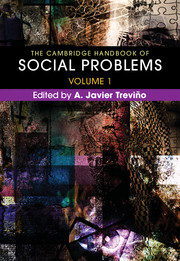Book contents
- The Cambridge Handbook of Social Problems
- The Cambridge Handbook of Social Problems
- Copyright page
- Contents
- About the Contributors
- Introduction
- Part I General Concerns and Orientations in the Study of Social Problems
- Part II Historical and Theoretical Issues in the Study of Social Problems
- Chapter 11 Settlement Sociology
- Chapter 12 Chicago School: City as a Social Laboratory
- Chapter 13 Luhmann's Sociological Systems Theory and the Study of Social Problems
- Chapter 14 The Conflict Approach
- Chapter 15 Radical Interactionism and the Symbolism of Methamphetamine
- Chapter 16 Social Constructionism
- Part III Problems of Discrimination and Inequality
- Part IV Problems of Institutions
- Index
- References
Chapter 11 - Settlement Sociology
from Part II - Historical and Theoretical Issues in the Study of Social Problems
Published online by Cambridge University Press: 16 March 2018
- The Cambridge Handbook of Social Problems
- The Cambridge Handbook of Social Problems
- Copyright page
- Contents
- About the Contributors
- Introduction
- Part I General Concerns and Orientations in the Study of Social Problems
- Part II Historical and Theoretical Issues in the Study of Social Problems
- Chapter 11 Settlement Sociology
- Chapter 12 Chicago School: City as a Social Laboratory
- Chapter 13 Luhmann's Sociological Systems Theory and the Study of Social Problems
- Chapter 14 The Conflict Approach
- Chapter 15 Radical Interactionism and the Symbolism of Methamphetamine
- Chapter 16 Social Constructionism
- Part III Problems of Discrimination and Inequality
- Part IV Problems of Institutions
- Index
- References
Summary
This chapter introduces the reader to settlement sociology, a school that grew out of one of the most radical inventions of the Progressive Era (1880–1920) – the social settlements. We develop our analysis of this school of sociology in two parts: one, the invention of the social settlement as a response to witnessing human pain; two, the development of settlement sociology as a system of theory, research, and advocacy whose project was to understand and reform the structures that produced this pain. The chapter explicates this theory in terms of key concepts from the work of Jane Addams (1860–1935) and Robert A. Woods (1865–1925) – disconnection, the neighborly relation, the power to combine, ethics, belated ethics, and the social ethic. It overviews the extraordinary body of research the settlements produced following this theory.
- Type
- Chapter
- Information
- The Cambridge Handbook of Social Problems , pp. 185 - 202Publisher: Cambridge University PressPrint publication year: 2018
References
- 2
- Cited by

